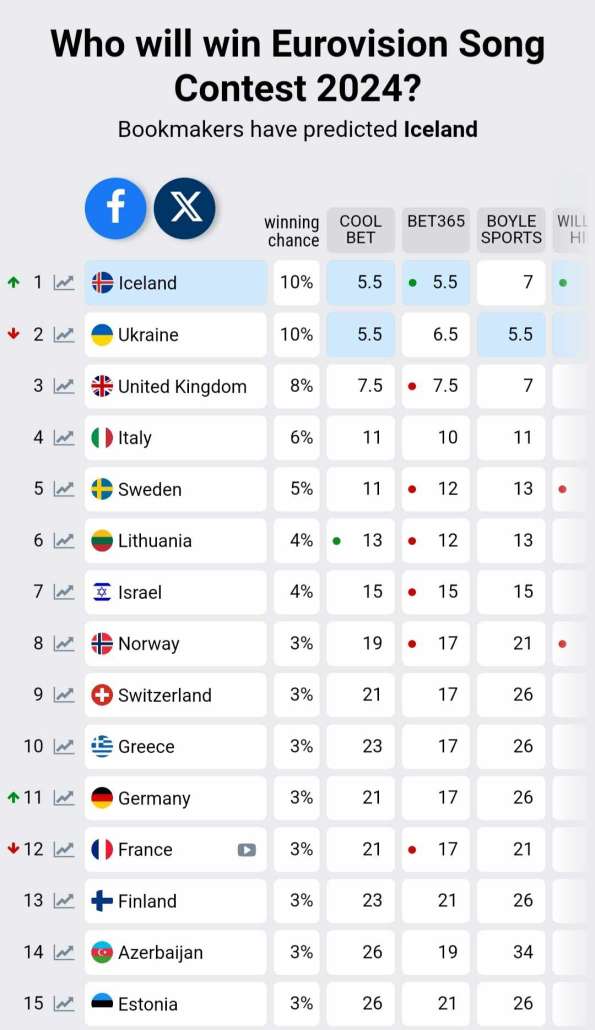Eurovision 2025: Former Contestants Demand Israel's Exclusion

Table of Contents
Reasons Behind the Call for Israel's Exclusion
The demand for Israel's exclusion from Eurovision 2025 is rooted in serious allegations concerning human rights abuses and the ongoing occupation of Palestinian territories.
Human Rights Concerns
Former Eurovision participants cite numerous human rights concerns as justification for their boycott. Reputable organizations like Human Rights Watch and Amnesty International have documented extensive violations, including:
- Restrictions on freedom of movement: Palestinians in the West Bank and Gaza Strip face significant limitations on their ability to travel, access essential services, and participate fully in society. These restrictions are frequently cited as a major obstacle to a just and peaceful resolution.
- Treatment of Palestinian prisoners: Allegations of ill-treatment, torture, and denial of basic rights within the Israeli prison system are frequently raised. These concerns are widely documented by human rights groups and international organizations.
- Demolitions of Palestinian homes and infrastructure: The systematic demolition of Palestinian homes and infrastructure, often carried out without due process, contributes to a climate of fear and instability. Such actions are seen as a violation of international humanitarian law.
- The blockade of Gaza: The ongoing blockade of the Gaza Strip, resulting in severe humanitarian crises, has been widely condemned by international bodies. The blockade significantly restricts access to essential goods, medical supplies, and movement.
These concerns are further underscored by numerous UN resolutions and reports that highlight the systemic nature of these human rights violations.
Allegations of Apartheid
A more forceful accusation leveled against Israel is that of apartheid. This claim, based on the Rome Statute of the International Criminal Court and numerous legal and academic analyses, alleges that Israel's policies and practices towards the Palestinian population constitute a system of apartheid, as defined by international law. The BDS (Boycott, Divestment, Sanctions) movement, a global campaign advocating for Palestinian rights, prominently features this allegation. The argument is that such a system, characterized by systematic discrimination and oppression, renders Israel's participation in a contest promoting inclusivity and universal values deeply problematic. Numerous academic papers and reports detail the legal arguments supporting these allegations.
The Role of the Eurovision Song Contest
The Eurovision Song Contest prides itself on its values of inclusivity, diversity, and artistic expression. Many argue that Israel's participation directly contradicts these stated values, given the serious allegations of human rights violations and apartheid. The argument posits that hosting the contest in a country accused of such abuses undermines the event's principles of neutrality and fairness. Previous controversies surrounding Eurovision, including politically charged performances and boycotts, highlight the vulnerability of the contest to political interference.
Reactions and Responses
The call for Israel's exclusion has generated a strong response, with both support and opposition emerging from various corners.
Support for the Boycott
The BDS movement and numerous human rights organizations have actively voiced their support for the boycott, citing the aforementioned human rights concerns as the primary reason. Many artists and activists have also joined the chorus, arguing that artistic expression cannot be separated from ethical considerations. The scale of support demonstrates a growing awareness of the Israeli-Palestinian conflict and its implications for international events.
Opposition to the Boycott
Conversely, opponents of the boycott argue that it constitutes an unfair targeting of Israel and infringes on freedom of expression. They emphasize the importance of maintaining the apolitical nature of the Eurovision Song Contest. Pro-Israel lobby groups actively counter the boycott campaign, arguing that it is counterproductive and harms efforts towards peace and dialogue.
The Future of Eurovision and Political Involvement
This controversy presents a significant challenge to the Eurovision Song Contest's future. The potential for future boycotts and political controversies raises concerns about the event's ability to remain a politically neutral platform for artistic expression. It necessitates a critical examination of the contest's guidelines and procedures for selecting host countries. Finding a balance between promoting cultural exchange and maintaining ethical standards will be crucial for the future of the Eurovision Song Contest. Potential solutions might include stronger vetting processes for host countries, clearer guidelines addressing human rights concerns, and a renewed commitment to the contest's stated values.
Conclusion
The call for Israel's exclusion from Eurovision 2025 highlights a deep and complex conflict. Former Eurovision contestants are raising serious allegations of human rights abuses and apartheid, challenging the event's claim to political neutrality. While opponents argue for maintaining the apolitical nature of the contest, supporters contend that ignoring such serious human rights violations would be a betrayal of the event's values. This controversy forces us to confront the difficult question of whether artistic expression can truly be separated from ethical considerations. We urge you to engage with this debate, research the facts, and form your own informed opinion on the future of Eurovision 2025 and the participation of Israel. You can find further information and resources on the websites of Human Rights Watch, Amnesty International, and the BDS movement. Let's continue the conversation about Eurovision 2025 and the crucial role of human rights in international events.

Featured Posts
-
 Epl Nottingham Forest Offer Update On Awoniyis Fitness
May 14, 2025
Epl Nottingham Forest Offer Update On Awoniyis Fitness
May 14, 2025 -
 Man Utd Transfer Target Sunderland Starlet Attracts Six Premier League Clubs
May 14, 2025
Man Utd Transfer Target Sunderland Starlet Attracts Six Premier League Clubs
May 14, 2025 -
 Taenaeaen Arvottu Eurojackpot Katso Oikea Rivi Ilta Sanomista
May 14, 2025
Taenaeaen Arvottu Eurojackpot Katso Oikea Rivi Ilta Sanomista
May 14, 2025 -
 Disney S Snow White 2025 Release Date And Streaming Availability
May 14, 2025
Disney S Snow White 2025 Release Date And Streaming Availability
May 14, 2025 -
 Nottingham Forests Awoniyi Injury News And Return Timeline
May 14, 2025
Nottingham Forests Awoniyi Injury News And Return Timeline
May 14, 2025
